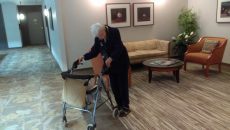By Lisa Kopochinski, NASW-CA Editor
In mid-November, I had the pleasure of sitting down for several hours with Professor Lillian Hyatt at her apartment at a Continuing Care Retirement Community in San Francisco to discuss the plight of senior citizens.
A long-time elder care advocate, Professor Hyatt, who is 92 and nearly blind, is a force to be reckoned with as she continues her mission of letting as many people as possible know the injustices — particularly financial — that many seniors face unknowingly when they choose to move into a CCRC.
A sterling example of empowerment, Professor Hyatt — who started her social work career later in life at the age of 58 after receiving her MSW from California State University, San Francisco in 1983 — became an adjunct professor of social work at SFSU. Throughout her career and to this day, she has inspired people to make a difference in numerous areas such as substance abuse impact on families, interfaith understanding, nursing home standards and elder care. The following is our interview.
Why did you start writing columns about CCRC issues, Professor Hyatt?
When I came here in 2000 to this CCRC (the Sequoias in San Francisco), I spent a great deal of money setting up my apartment and figured I was going to stay here for the rest of my life. What happened is that I developed a swallowing problem called cricopharyngeal spasms. What that meant is that I needed puréed food to live. There was nothing else wrong with me. I could see, I could drive a car, but was told that in order to receive puréed food, I had to go to the skilled nursing facility 16 years ago. And that, I refused to allow.
I hired legal help and finally forced them to give me puréed food in my apartment. I was willing to do a great deal of work to live and eat in my apartment. I would not submit to being pulled out of my apartment so that it could be sold to other people — probably a couple — where the CCRC could get a lot more money than they could get from me. That’s when I began to write for the newsletter for the National Association of Social Workers–California Chapter.
My first editor was NASW-CA Executive Director Janlee Wong, and we have been fast friends ever since. I think that had I moved into skilled nursing, I would have committed suicide after one year living in a room with three other people and sharing a toilet — instead of my lovely, clean apartment that I had spent $54,000 on improving. I put in parquet floors and a beautiful bathroom with a shower. This cost me a great deal of money and I wasn’t about to move out. That was the beginning of my career as a journalist writing columns and I became an expert in CCRCs and their ways of oppressing elderly people.
Professor Hyatt remains quite mobile even though she has lost most of her eyesight.
Her office is equipped with computer technology for the blind.
This saying on her pillow could not be more true!
A letter was sent from the San Francisco’s Ombudsman’s office dated 12/14/12 to your CCRC. Please share the back story on this letter.
The reason the Ombudsman office mailed this letter is because their office realized I was being bullied and oppressed by the CCRC management. The Ombudsman office has no authority to enforce laws. What happens is that residents are at the mercy of management and are oppressed if they speak out and be truthful. And that is one of the drawbacks of living under a CCRC management. If you are outspoken and truthful, they will make it appear that you are mentally unsound so that none of the other residents will listen to what you have to say, or care what is happening to you. That is worst of all because they are destroying a human being’s self-esteem and self-image.
In the letter from the San Francisco Ombudsman Program, “harassment” and “intimidation” are forms of elder abuse, as defined as follows:
Welfare and Institutions Code Section 15607.3 state that an elder who has suffered abuse may seek protective orders as is discussed in this section of the law; to quote: “This order would enjoin a party from abusing…intimidating…harassing…” an elder.
Professor Hyatt, why should we be concerned about senior citizens who choose to live in high-priced CCRCs. After all, they can afford it, can’t they?
We should be concerned because when people work hard their whole lives and provide for their old age without being a burden on society, they have a right to dispose of their sources of income the way they want to, rather than have every penny stripped away. I came in paying $1,200 a month in 2000. Now, I am paying $67,000 a year — which was never my plan. Some people have disabled children, or children who are unhealthy. They expect to leave something to them. To find out at the end of their lives that every penny has been taken from them, and that they have run out of money and must subsist on the “charity” of CCRC management, can be devastating. This has to be carefully explained before they sign their contract.
What do you say to those people who say, “Well, you signed the contract. Didn’t you know what you were signing?”
No. I didn’t really understand. I never expected to live to be 92. I expected to die at the age my parents died — which was the mid-70s. But many people in this income bracket survive to live to be 100 years of age, which never happened in the past. We have many of them and now they are being taken into CCRCs — not when they are reasonably healthy — as they were when I came in. They will be accepted even if they are coming to the CCRC to die.
We have people who are actually brought in here ill and are never offered long-term care. But they came here because they knew they were going to die, and wanted to die in protected surroundings, and then found that they did not get what they were told they were going to get. I don’t think anyone should come in here without getting all of the facts about what their financial future holds. If they understand that, and decide to come in anyway, that’s their decision. But they must be given all the facts and all the probabilities of what may happen to them before they sign that contract.
What is your primary mission in all of this? What do you want to accomplish?
My main mission is to make it clear that, before seniors sign contracts, they know exactly what they are buying. Is it all the beautiful things that the marketing department tells them, or is it the contract they sign, which binds them. CCRCs are selling a product that doesn’t actually exist because many people have to leave their apartments, so that management can resell them.
They are moved to three possibilities: a skilled nursing facility, assisted living, and the dementia unit, depending on where management feels they can put them. At the time I moved in here in 2000, there were only two possibilities — assisted living and the skilled nursing facility. And, from my own experience, they chose the skilled nursing facility for me, which was totally inappropriate. My doctor confirmed this recently.
So, anybody who signs a contract has to understand that this may be in their future. That needs to be clearly explained by marketing, and it isn’t. In my own case, nobody brought up these issues. I was given a resident’s rights piece of paper and asked to sign it. I told the marketing director that I hadn’t read it and, therefore, couldn’t sign anything I hadn’t read. The marketing director then said, “If you don’t sign it, here’s your check back. We aren’t going to take you in.”
Needless to say, after I sold my home and had nowhere to go, I signed what I had not read about resident’s rights. I consider that akin to fraud.
Professor Hyatt, what is your motive for speaking to the media now?
I haven’t long to live. I have lost so much weight that I know my life will not be extended more than a few months. This is something I want to accomplish before I die. There is no way to get any help from the agencies (i.e., Department of Social Services and Department of Public Health) that we are paying our tax dollars to support because they are not investigating complaints properly. They handle complaints two ways: If they are forced to investigate it, they say the complaint is unsubstantiated and they don’t have to go further. Or, they don’t respond at all.
So, I am left with only one alternative — to speak to the media and hope that this will become so widely known that the CCRC industry is in need of reform. Years ago, there was a book called The Jungle, by Sinclair Lewis, who exposed what went on in stockyards in the meat packing industry. Well, I’m doing a Sinclair Lewis on the CCRC industry. They are being subsidized by money from seniors. Yes, they have substantial means, or they wouldn’t be admitted to a CCRC, but regardless of how you do robbery without a gun, by taking all of a person’s assets before they die, so they have nothing to leave to their family, is to me a crime, and must be exposed as such.
Professor Hyatt, it has been an honor speaking with you today.
Professor Hyatt and NASWCA Editor Lisa Kopochinski have become great colleagues and friends over the past decade.

















